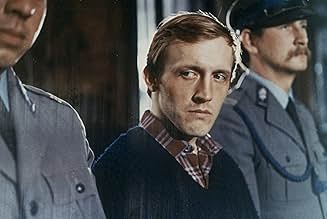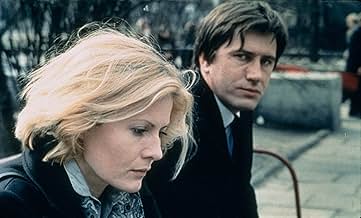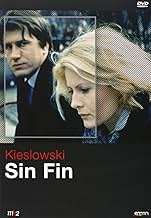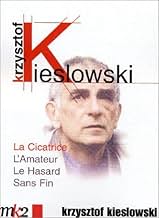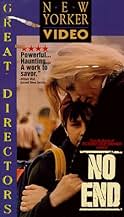IMDb RATING
7.3/10
6.1K
YOUR RATING
The wife of the recently deceased lawyer tries to cope with grief after his loss and to keep his last case going in court.The wife of the recently deceased lawyer tries to cope with grief after his loss and to keep his last case going in court.The wife of the recently deceased lawyer tries to cope with grief after his loss and to keep his last case going in court.
- Director
- Writers
- Stars
Danny Webb
- American
- (as Daniel Webb)
Jacek Domanski
- Dzialacz opozycji
- (uncredited)
- Director
- Writers
- All cast & crew
- Production, box office & more at IMDbPro
Featured reviews
Although there is the obvious plot of the grieving wife, the movie is really about Poland under martial law. Probably unable to directly focus on such political topics, Kieslowski attempts to 'hide' this other side beneath a twisted Ghost subplot.
A dark movie, one that demands attentive viewing, this one will probably never be as successful as some of Kieslowski's other works, which have probably led its viewers to pick up this one.
A dark movie, one that demands attentive viewing, this one will probably never be as successful as some of Kieslowski's other works, which have probably led its viewers to pick up this one.
Grazyna Szapolowska's husband dies. He was a public defender, so she tries to arrange for his last client, Artur Barcis, to have a good defendant. She arranges for Aleksander Bardini, under whom her husband had apprenticed, to take the case. Barcis is accused of having led an illegal strike, and Bardini works to have him tread the middle ground of confessing and denial.
Krzysztof Kieslowski's movie is a murky one that tells us we can never tell what is going on at the moment. Only in retrospect can we figure out what was going on, and even that may not be true. It is a gloomy movie, with a lot of motivation left unclear. Did Miss Szapolowska really love her husband? Why has Bardini, who hasn't taken a case of this sort for more than 30 years, taken this one? What was the strike actually about? That remains uncertain, even after the movie's end.
Krzysztof Kieslowski's movie is a murky one that tells us we can never tell what is going on at the moment. Only in retrospect can we figure out what was going on, and even that may not be true. It is a gloomy movie, with a lot of motivation left unclear. Did Miss Szapolowska really love her husband? Why has Bardini, who hasn't taken a case of this sort for more than 30 years, taken this one? What was the strike actually about? That remains uncertain, even after the movie's end.
The narrative in this film is far too flawed. There are two intertwining halves of it, one good, one poor. The good one involves a woman, Ulla, whose husband died suddenly and unexpectedly one morning while he waited in his car to take their son to school. Now he gently haunts his family as they deal with the pain. The acting is magnificent here. Kieslowski is masterful at directing his actors in material like this, as he would show a million different times in The Decalogue, made a few years later. There are a few outrageously and subtly powerful scenes. Most memorable is the one where Ulla decides to prostitute herself to a British tourist. This happens about a month after her husband has died. After the man has sex with her, she asks him if he speaks Polish. He says no, and then she begins to talk about her problems in Polish. The other half of the plot is utterly weak in comparison. The husband was a lawyer, and the defendant in the case he was working on is screwed because of the death. The defendant's wife comes to Ulla for help, and though she is refused help at first, Ulla eventually introduces her to her husband's mentor, a cynical old man about to be kicked out of the business. Perhaps it's just my aversion to lawyer and courtroom dramas, but I just didn't care a lick what happened in this part of the plot. Supposedly it's meant as a criticism against the Communist law at the time. I don't know. It's dull whatever it is. But the film is slightly worth watching, especially for the acting. Even in the parts that I didn't care for, the acting is exquisite. 7/10.
...and not much of a middle, either. Beginning's pretty good, though. Is it just me or is TCM Imports, under Alicia Malone, grimly determined to show every single heavy, stolid, dull, depressing film from Mr. Kieslowski? Just one solid, grey, bleak, enervating shroud until I finally cried "wystarczajaco" right around the time Antec's lovely, grieving widow, for reasons best known to Kieslowski and herself, decides to sleep with a random English dude she picks up in a bar. If I were a cynical sort I'd say that the dour Pole had a commercial side to his foreboding personality as I'm sure the sight of Grazyna Szapolowska's luscious bod did not exactly discourage ticket sales. God knows, you need something to quicken the ol pulse as you watch this bloodless bunch, cigarettes stuck firmly in their mugs, stare into the abyss, weep, occasionally crack a bitter joke and stare some more. For awhile, I was hoping that there would be some courtroom drama since the plot seemed to involve a lawyer trying to free a political prisoner. But at the film's halfway mark nary a judge, jury or executioner were to be found. Unless, of course, you see Kieslowski as the hangman of all that is dramatically compelling. C plus.
Mesmerising, if only for the performance by Grazyna Szapolowska as the widow who moves through the film and ignites every scene. Beautiful and tragic at once she emanates power over the audience and one cannot turn away. I had not realised how much this film must have influenced some established mainstream films that we assume to be original. Obviously many of them owe a great debt to this story. Told unflinchingly by Kieslowski in a unshowy manner it still demonstrates moments of brilliant insights into the human condition. The pain and torture we must endure after such heartache runs through the the heart of this film. I particularly liked the little moments as always, such as the glass slipping through her fingers, the dog trying to get in the car, the dirt on her hands from the bumper whilst witnessing the accident, the hypnotherapy session where she sees him. All simple and yet so elegant. No hammering it through to the audience with big signposting saying 'Remember this for later!'. Why don't more films treat the audience with a tiny bit more intelligence or is the majority of film going to assume we are all thick. And just because a film is mainstream doesn't mean it has to be low brow. Godfather, Deer Hunter, French Connection? Very strong films? If you see this also see Amator.
Did you know
- TriviaThe film takes place in 1982.
- Quotes
[First lines]
Antek Zyro: [speaking directly to the camera] I died - four days ago.
- How long is No End?Powered by Alexa
Details
- Release date
- Country of origin
- Languages
- Also known as
- No End
- Filming locations
- Bródno, Targówek, Warsaw, Mazowieckie, Poland(car accident scene)
- Production company
- See more company credits at IMDbPro
Contribute to this page
Suggest an edit or add missing content

